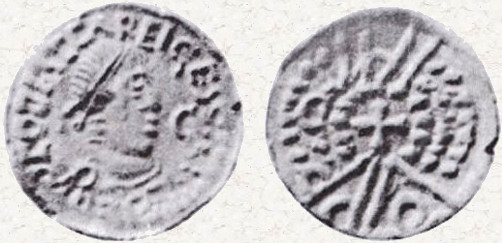Andeca on:
[Wikipedia]
[Google]
[Amazon]
 Audeca or Andeca ( la, Audacer) was the last
Audeca or Andeca ( la, Audacer) was the last
''Identity and Interactions: The Suevi and the Hispano-Romans''
University of Virginia, Spring 2007. * Grierson, Philip, and Blackburn, Mark. ''Medieval European Coinage, with a Catalogue of the Coins in the Fitzwilliam Museum, Cambridge'', vol. 1, The Early Middle Ages (5th–10th Centuries). Cambridge University Press, 1986. {{DEFAULTSORT:Audeca 6th-century Suebian kings
 Audeca or Andeca ( la, Audacer) was the last
Audeca or Andeca ( la, Audacer) was the last Suevi
The Suebi (or Suebians, also spelled Suevi, Suavi) were a large group of Germanic peoples originally from the Elbe river region in what is now Germany and the Czech Republic. In the early Roman era they included many peoples with their own names ...
c King of Galicia
Galicia is an autonomous community and historical nationality in modern-day northwestern Spain on the Iberian Peninsula, which was a major part of the Roman province known as Gallaecia prior to 409. It consists of the provinces of A Coruña, ...
from 584 until his deposition in 585. He deposed Eboric Eboric or Euric was the last legitimate Suevic King of Galicia. He was the adolescent son of Miro and Sisegutia (or Siseguntia) and he succeeded his father in 583, ruling for a year before being deposed by his mother's second husband, Audeca, who ...
and usurped the throne by marrying the young king's mother, Siseguntia (or Sisegutia), the widow of Eboric's father and predecessor, Miro. He consigned Eboric to a monastery.
This action gave the Visigothic
The Visigoths (; la, Visigothi, Wisigothi, Vesi, Visi, Wesi, Wisi) were an early Germanic people who, along with the Ostrogoths, constituted the two major political entities of the Goths within the Roman Empire in late antiquity, or what is kno ...
king Leovigild
Liuvigild, Leuvigild, Leovigild, or ''Leovigildo'' (Spanish and Portuguese), ( 519 – 586) was a Visigothic King of Hispania and Septimania from 568 to 586. Known for his Codex Revisus or Code of Leovigild, a law allowing equal rights between the ...
an excuse to invade the Suevic kingdom, which he did in 585. According to John of Biclar
John of Biclaro, Biclar, or Biclarum (''c.'' 540 – after 621), also ''Iohannes Biclarensis'', was a Visigoth chronicler. He was born in Lusitania, in the city of ''Scallabis'' (modern Santarém in Portugal). He was also bishop of Girona.
Earl ...
, "Leovigild devastated Galicia, deprived the captured King Audeca of his rule, and brought the people, treasure, and territory of the Suevi under his own power. He made Galicia a province of the Goths." John goes on to say that he "tonsured udecaand dignified imwith the honour of the priesthood, after having held that of the kingship." The deposed usurper was relegated to the city of Beja. To Isidore of Seville
Isidore of Seville ( la, Isidorus Hispalensis; c. 560 – 4 April 636) was a Spanish scholar, theologian, and archbishop of Seville. He is widely regarded, in the words of 19th-century historian Montalembert, as "the last scholar of ...
, his deposition meant the end of the Suevic kingdom, which had lasted 177 years from Isidore's starting point of 408: "the kingdom which they he Sueves
He or HE may refer to:
Language
* He (pronoun), an English pronoun
* He (kana), the romanization of the Japanese kana へ
* He (letter), the fifth letter of many Semitic alphabets
* He (Cyrillic), a letter of the Cyrillic script called ''He'' ...
held in idle lethargy, they have now lost at an even more shameful cost, although it may seem quite amazing that they had managed to retain up to the present day that which they have now given up without any show of resistance."
After Audeca, the Suevic kingdom ceased to exist, but one pretender, Malaric Malaric or Amalaric was the last man to claim the kingship of the Suevi of Galicia. In 585, after the last king, Audeca, was defeated and captured by the Visigoths, Malaric, who claimed to be related to king Miro, rose in rebellion. According to ...
, briefly led opposition to the Visigoths.
A coin bearing the inscription ODIACCA REIGES (probably "King Odiacca") has been identified as one belonging to the reign of Audeca. The sole known coin of the type was kept in Madrid and lost in 1936. The only other Suevic king to mint coins bearing his name that have survived to this day is Rechiar
Rechiar or Flavius Rechiarius (after 415 – December 456) was the third Suevic king of Gallaecia, from 448 until his death, and also the first one to be born in Gallaecia. He was one of the most innovative and belligerent of the Suevi monarch ...
.Grierson and Blackburn, ''MEC'', p. 79.
Notes
Sources
*Arias, Jorge C''Identity and Interactions: The Suevi and the Hispano-Romans''
University of Virginia, Spring 2007. * Grierson, Philip, and Blackburn, Mark. ''Medieval European Coinage, with a Catalogue of the Coins in the Fitzwilliam Museum, Cambridge'', vol. 1, The Early Middle Ages (5th–10th Centuries). Cambridge University Press, 1986. {{DEFAULTSORT:Audeca 6th-century Suebian kings